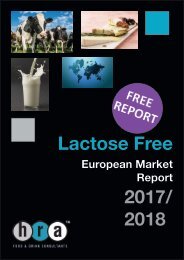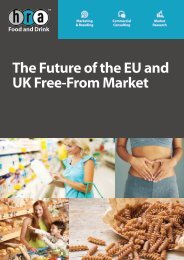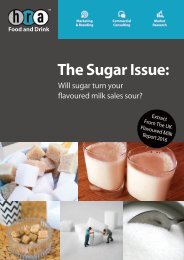Flavoured_Milk_Free
The backdrop to the UK flavoured milk market is one of relentless change. The removal of the EU milk quotas, the transition by emerging economies to a Western-style diet, the upcoming introduction of the ‘sugar tax’ and the booming sports nutrition industry are all aspects of change that create both challenges and opportunities for the UK flavoured milk market. HRA Food and Drink has developed this report as a map to guide industry stakeholders. Although volume growth in 2014 was slightly lower than in previous years, the flavoured milk market still has plenty of room for product innovation in the future.
The backdrop to the UK flavoured milk market is one of relentless change. The removal of the EU milk quotas, the transition by emerging economies to a Western-style diet, the upcoming introduction of the ‘sugar tax’ and the booming sports nutrition industry are all aspects of change that create both challenges and opportunities for the UK flavoured milk market.
HRA Food and Drink has developed this report as a map to guide industry stakeholders. Although volume growth in 2014 was slightly lower than in previous years, the flavoured milk market still has plenty of room for product innovation in the future.
You also want an ePaper? Increase the reach of your titles
YUMPU automatically turns print PDFs into web optimized ePapers that Google loves.
UK FLAVOURED MILK MARKET 2017 & BEYOND<br />
Despite the availability of artificial and natural sweeteners, the flavoured milk industry has<br />
been slow to embrace the lower sugar theme. There is evidence that the tide is now turning,<br />
with certain brands, notably Frijj, developing reduced sugar versions of their most popular<br />
offerings.<br />
8.3 The sugar debate in the UK<br />
Why is the sugar debate so lively now?<br />
• In October 2015, Public Health UK published the report Sugar Reduction:<br />
The evidence for action.<br />
• 25% of adults, 10% of 4 to 5 years olds and 19% of 10 to 11 year olds in<br />
England are obese.<br />
• March 2016, the Chancellor announces “Sugar Tax” to be implemented in<br />
2018.<br />
How is the<br />
debate<br />
happening?<br />
• Through social<br />
media<br />
• At food and<br />
drink industry<br />
events<br />
• In parliament<br />
• Academic<br />
To view please<br />
purchase full report<br />
What is it about?<br />
• The UK<br />
population is<br />
eating too much<br />
sugar.<br />
• It is a public<br />
health issue<br />
costing the<br />
NHS £5.1bn<br />
annually.<br />
through related<br />
Where is it<br />
happening?<br />
Globally, specifically:<br />
• United States<br />
• European Union<br />
• United Kingdom<br />
Figure 8.4: Understanding the 2016 sugar debate in the UK<br />
Who does it<br />
affect?<br />
• The UK<br />
population<br />
• The UK<br />
Government<br />
• The Food and<br />
Drink Industry<br />
• Charities<br />
When did it begin?<br />
Over the past 30-40 years, food, including sugar:<br />
• Has become more readily available, more convenient and more<br />
processed<br />
• Is subject to more marketing and advertising.<br />
• In real terms, it is much cheaper. Sugar is no longer a luxury.<br />
140<br />
© 2016 Teepee Limited. All Rights Reserved.







